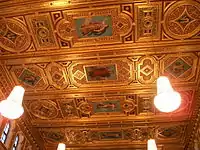August Eisenmenger
August Eisenmenger (11 February 1830 – 7 December 1907) was an Austrian painter of portraits and historical subjects.


Life
He was born in Vienna. At the age of fifteen, Eisenmenger was already a student at the Academy of Fine Arts Vienna and won first prize in drawing. In 1848, his financial circumstances forced him to leave the Academy. He didn't find a secure position until he became a student/employee at Carl Rahl's studio in 1856.[1]
In 1863, he became a drawing teacher at the Protestant School in Vienna. He eventually obtained a professorship at the Academy in 1872. He also established a private school where he taught Rahl's style of monumental painting. Rudolf Ernst was one of his best known pupils there.[1][2]
He died in Vienna in 1907. In 1913, a street in Vienna's Döbling district was named after him. Later, that street was removed for an industrial site and a new street was dedicated to him in the Favoriten district in 1959.
One of Eisenmenger's sons, Victor Eisenmenger, was the personal physician to Archduke Franz Ferdinand.[3]
Major works
- Apollo and the Nine Muses, ceiling panels in the Vienna Musikverein.
- The ceiling panels in the Grand Hotel.
- The Twelve Months, an oil panel at the Palais Gutmann[4]
- Ancestral portraits and panels depicting episodes in the lives of Maximilian I and Leopold V; at Hernstein Castle.
- The frieze medallions at the Museum of Applied Arts, Vienna[5]
- Frieze medallions in the meeting room of the Chamber of Deputies in the Austrian Parliament Building.[5]
Ceiling panels at the Musikverein
References
- Österreichisches Biographisches Lexikon 1815–1950. Band 1, Verlag der Österr. Akademie der Wissenschaften, Graz/Köln 1957, ISBN 3-7001-0187-2, S. 237.
- Albrecht Weiland: Der Campo Santo Teutonico in Rom und seine Grabdenkmäler. Band I, Herder, Freiburg im Breisgau 1988, ISBN 3451208822, S. 255 f.
- "Baron Eisenmenger, court physician, dead; medical adviser to late Archduke Francis Ferdinand and Ex-Emperor Charles". The New York Times. 12 December 1932.
- Palais Gutmann Archived January 8, 2014, at the Wayback Machine
- Meyers Konversationslexikon 1888–1890
Further reading
- Werner Kitlitschka: Die Malerei der Wiener Ringstraße. Verlag Steiner, Wiesbaden 1981, ISBN 3-515-02484-0.
- Helga Tichy: August Eisenmenger 1830-1907. Ein Wiener Maler der Ringstraßenzeit. 2 Vols., unpublished thesis, Vienna 1997.


